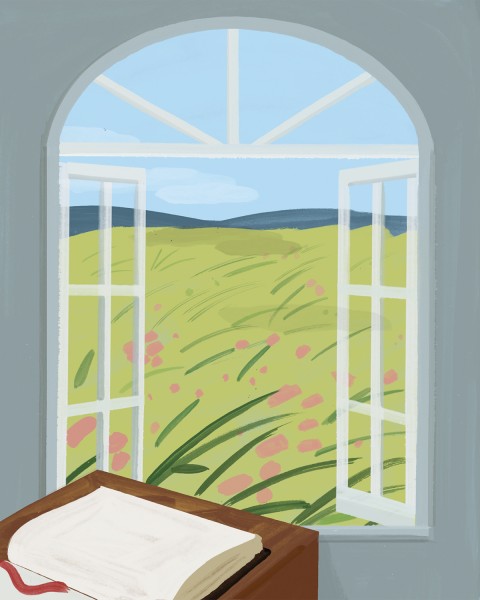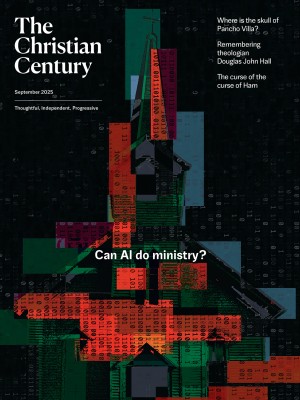I’m learning to let go of ‘preaching pretty’
Some Sundays, my congregation needs a word that’s more raw than polished.

Illustration by Tallulah Fontaine
Recently I changed my entire sermon on a Sunday morning. This might not sound remarkable—I hear preachers do it all the time—but it was the first time I ever did it. It was horrifying. Thank God it happened.
I come out of a school of preaching—and a way of life, perhaps—that teaches you to “preach pretty.” While this idea can be used as a critique—someone is all style and no substance—its primary implication is that a sermon is a pollinating flower: it’s doing important work, and it looks good doing it. Preaching pretty is both substantive and appealing; one mentor of mine called it “hiding the spinach under the ice cream.” Time is the key ingredient. Mentors have led me through their manuscripts and shorthand, down to the moments you think are spontaneous but were actually carefully rehearsed long before Sunday. It looks natural because they had time to prepare it, and every time I hear these masters, I stare at them with the admiration of a young magician.
Read our latest issue or browse back issues.
All this means that 98 percent of the time, my sermon is ready by Thursday. This is not a humblebrag. For me, a Saturday night special creates anxiety my body doesn’t hold well, while any edits I make on Sunday morning are likely to be fumbled in the delivery. And all I want to do is give you what God has given me, with as much polish as possible.
I have preaching friends—I’m going to call them Jedi—who can approach the pulpit with barely an outline, having done no preparation but saying they “trust the Spirit to move.” My response to what comes out of them in those moments, and the effect it has on their communities, is about the closest I ever get to envy in what is a perfectly unenviable vocation.
They don’t need time, but I do. Lots of it. To turn three sentences into one, to let a five-minute explanation settle into 20 seconds. I am the living, breathing embodiment of the famous postscript, attributed to Mark Twain and others, “If I had more time, I would have written you a shorter letter.”
So imagine it’s Saturday night, and you’re a preacher sitting on your couch, luxuriating in readiness, when the phone flashes. Then twice. Three times. Texts and calls: “We just entered the war.” “I’m trying not to panic.” “Our world is burning!” While I’d like to say that being a pastor makes me slower to anxiety than others, a truer statement is that I learned decades ago to deflect external stressors as a coping mechanism. This is not incredibly healthy now, but this isn’t therapy. What matters is this: when this happened to me, the sermon I had prepared was not the sermon people needed. And the clearer that became, as the evening dragged into Sunday morning, the more nervous I became.
It was 8 a.m., and I had no sermon. No scripture passage, no illustration, no historical tidbit, no personal anecdote about my children, nothing to make pretty because I had nothing at all, really, except this: a word that, all throughout the night, it felt like God was giving to me. That word was breathe. And the more I heard it, the more irritated I became with your God (like when parents say “your child” to each other). “I don’t want to breathe!” I said. “We worked together on a perfectly good sermon days ago, and you know how overwhelming my life is, and I probably have a column to write that’s days overdue (sorry, Steve), along with many other unfinished things hovering about. So if you’re going to press me even further, God, the least you could do is give me something, instead of just telling me to breathe.”
Oh. This was the sermon. The word was the Word—the logos made flesh—and the people I was walking alongside, the people texting me all night to say they were “definitely” coming to church now because they “needed something for all this,” didn’t need something pretty or polished. They needed to be reminded of what Jesus said. They just needed to hear it.
How did it go? Well, I was nervous, but I went in trusting that the Spirit would do the work that I couldn’t. I felt unprepared, like my congregation would feel shorted, but I held to a faint hope that even without ice cream, they would still eat the spinach.
And they did. No one was blown away, but we breathed together, and we left reminded that death comes for our breath—literally—so every breath we take, especially a difficult one, is an act of resistance and resurrection. Or whatever it was that I said—I’m not sure, because it wasn’t written down.
These moments have come up a lot more often lately, moments when I choose the raw version over the polished one, or instead of lifting up some theological counterweight to our fear I simply admit that I’m scared, too. People have come up to me to say that I was speaking directly to them, and instead of just thanking them politely, I’ve replied, “I’m grateful, but that was for me.” It is probably my own tribulation, whether self-induced or externally absorbed, that is informing my preaching. But I can say this: It hasn’t been pretty in a while.
Yet this is far and away the best I’ve ever felt about myself and this work. It’s a reminder to me that sometimes—maybe especially during these trying times—what we need most isn’t a sermon but a conversation, a chance to talk or yell or cry. It’s a reminder that my vocation as shepherd isn’t always about leading the flock somewhere; sometimes it’s about standing in the crap with them. And that ain’t pretty.







